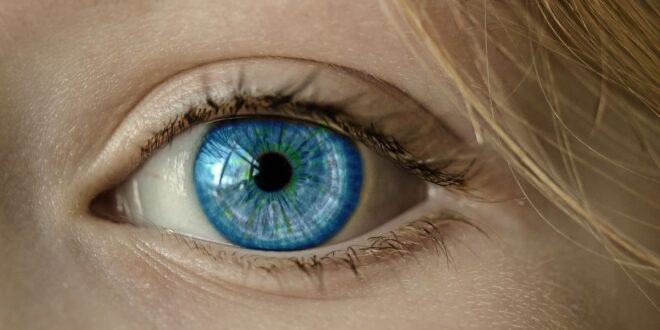Blinking is a habit every human being does and is something we all take as our body’s natural function. However, there is so much more to blinking. You may wonder why we blink, how we blink, and how many times we blink a day.
In general, humans blink between 14,400 to 19,200 times a day. A blink takes around 100 to 150 milliseconds. Blinking rates may be affected by many situations, such as age, level of fatigue, or if the person is under psychological stress.
This article discusses how many times a person blinks a day. We also explore blinking-related issues, such as why and how we blink and if we blink while sleeping.
Finally, we also explore the factors that may cause you to blink more often and also less often.
Why Do We Blink?
Blinking is done for many reasons, such as lubricating the eyes. This helps to spread our tears around, ensuring the whole eye gets enough lubrication. Blinking also helps to clear debris from the eyes. However, humans also blink when they are under psychological stress, such as when lying or tired.
Naturally, blinking is a natural process that our eyes do. Many reasons contribute to it, but generally, most of the reasons are to protect our eyes or to indicate psychological or physiological stress.
Lubricate And Refresh Our Eyes
The main function of the habit of blinking is to lubricate our eyes. Our eyes are constantly exposed to the environment, which means they may lose moisture rapidly. Blinking helps recoat the eyes with moisture to prevent dry and sore eyes. Blinking also helps to spread this extra moisture evenly to our eyes.
Aside from delivering moisture, blinking also helps to supply our eyeballs with oxygen, keep it fresh, and to work well. This helps us to focus on our tasks and be able to complete them well.
Clear Debris From Eyes
Our eyes are constantly exposed to the air, meaning debris and dust could easily settle there. We have eyelashes to help keep some of these nasties away, but at times, some may still end up directly in our eyes.
As a result, our eyes will blink to spread some moisture to the eyes to help remove this debris. If not removed, they may irritate our eyes and make them sore.
Physiological Stress
This may be surprising to some, but our eyes do blink more in the event of some physiological stress. For example, when you are tired. If you work facing a strong light source such as a computer, your eyes may also blink more.
There is not much explanation about why you may blink more when you are tired, but it is believed that as you get tired, your ability to control your blinking may be less strong, which means the blinking may become more rapid.
Psychological Stress
Blinking could also intensify in situations when you are under psychological stress. Suppose you are being interrogated or asked questions, and your answers may have heavy repercussions. In such a situation, you are likely to blink more.
Blinking could also become more rapid when you are lying. Psychologists have observed such things, and think that the eyes blink more as a way to manage stress.
Resting The Eyes
Blinking could also serve as a way to help your brain reset, and refocus on your effort. This is why you may see how some people may close their eyes under stress.
When you close your eyes, your vision comes back, and your brain stops receiving input. This allows you to free up your mind. When you reopen your eyes, you can refocus on your effort and add a new input to your brain.
How Do We Blink?
The blinking motion is controlled by two major muscles, orbicularis oculi, and levator palpebrae superioris. orbicularis oculi control the closing of the eyelid, and the levator palpebrae superioris reopens the eye.
Blinking is a natural response, mostly happening without us realizing it. This is because blinking takes only about 100-150 milliseconds to complete.
In natural blinking, the eyelid closes when the muscle orbicularis oculi contracts, causing the eyelids to droop. As a result, the eyelids cover the eyes, spreading moisture to the eyeball to coat it.
The eyelid then goes up when the muscle levator palpebrae superioris contracts, pulling the eyelid up. It may spread more moisture or remove some of the debris in the eyes as it goes up.
In more deliberate blinking, the same muscle groups may also be used to complete the blinking process. Perhaps the difference would be that since there is a physical attempt to do so, you may try to hole the eyelids closed longer.
What Are The Types Of Blinking?
There are three types of blinking, voluntary, spontaneous, and reflex blinking. This blinking differs in intensity, speed, and if the blinking effort is deliberate. Some blinking types are also designed to protect our eyes from potential physical harm.
Blinking could be done deliberately or let happen naturally. However, you may further divide blinking into several types.
Spontaneous Blink
Spontaneous blinking is the most common blinking done by humans. This blinking is mainly done to provide moisture to the eyeballs and clean it. Spontaneous blinking is done without external stimuli or any deliberate effort from you.
Your premotor brain stem regulates spontaneous blinking, which means you may do it all the time without realizing it. It is similar to breathing and digestion.
Voluntary Blink
A voluntary blink is blinking done with an internal, deliberate effort from you. It is rather uncommon to perform this unless you have the intention to do so. This could be when you are applying makeup or when you voluntarily close your eyes when you exit the water while swimming.
Reflex Blink
If you find yourself constantly blinking when trying to apply eyeshadow, it is because of the reflex blink.
Reflex blinking commonly happens when the eyes receive an external stimulus that may signal harm. For example, a fast object that appears rapidly in front of the eye or any contact with the eyeballs.
Reflex blinking is usually spontaneous, without us controlling it. Reflex blinking may also be faster than a spontaneous blink.
How Many Times Does A Person Blink A Day?
Humans normally blink between 14,400 to 19,200 times a day. Blinking rates may be affected by many situations, such as age, level of fatigue, or if the person is under psychological stress. External stimuli may affect blinking rates as well.
You may be blinking for various reasons, voluntarily or involuntarily. Spontaneous, voluntary, or reflex. From the time you wake up, and finally, fall asleep at night, you should have blinked about 14,400 to 19,200 times.
If you calculate that into hours, that means blinking about 900-1,200 times an hour. Multiply that into weeks and you will get around 100,800 to 134,400 times a week. If you calculate that into a year, your eye would have blinked a staggering 5.2 – 7.1 million times yearly.
That is a serious figure, and here is another – you probably spend about 10 percent of your awake time blinking. The immense figure also should tell you how much your brain protects your eyes, and how well your small eyelid muscles work.
What Happens If We Do Not Blink?
Without blinking, you may start to have dry eyes, as it is not receiving enough moisture. Your cornea may also swell, as it is not receiving oxygen. You may suffer from eye pain and blurry vision and risk eye infection, as any foreign objects in the eye cannot be removed.
There is a reason why blinking is made to be spontaneous. It is to help us naturally protect our eyes without putting in too much effort to blink. However, is it possible to not blink or place a barrier to not allow blinking to happen?
You can do that, but our eyes need the blinking to remoisturize and re-oxygenize. Without it, the eyes can suffer from a multitude of issues:
Dry Eyes
As a start, if you stop blinking, you will first notice that your eyes start to dry out. This is because the moisture coating on the eyeball has evaporated, leaving you with dry eyes. Dry eyes can be uncomfortable and may be painful, with a stinging sensation.
Eye Infection
When you stop blinking, what happens is that your eyes stop receiving the regular moisture and clearing it regularly gets. This means all the debris and dust settled on your cornea remains.
This debris and dirt may carry bacteria or other nasties that may cause infection, leaving you with red, swollen eyes that look scary to people around you.
Swelling Cornea
Blinking also helps to deliver oxygen to your cornea, which it gets from the moisture coating. Your cornea does not have blood vessels to deliver oxygen to your eyes.
That means if you do not blink, there will be no moisture coating, leading to no oxygen to the eyes. Without oxygen, your cornea may swell and may bring more issues, such as blurry vision and more. In fact, when you sleep, your cornea actually swells a little, before normalizing again after you wake up.
Blurry Vision
As your eyeballs stop receiving moisture and oxygen, your cornea swells. This may result in an uneven eyeball shape, which may cause the cornea to not reflect light well inside your eye.
As a result, you may notice that your vision becomes blurry and inconsistent. Since the inconsistency may be different on each side of the eye, your ability to use stereoscopic vision may also be affected. This means you may have issues judging distance.
Uncontrolled UV Exposure
If you do not blink, your eyes will be at the mercy of all the lights around them. This means if you are under the sun or looking at a bright area, your eyes will absorb 100% of the lighting.
Unfortunately, this also means your eyes will take in all the UV lights. This may result in your cornea becoming burnt, and you may suffer temporary blindness.
Insanity And Mental Illness
If you continue to not blink, you may not be able to sleep. Only about 10% of humans can sleep with their eyes open. Long-term loss of sleep can result in unstable mental conditions, which may trigger insanity.
This condition may happen to those who live in extremely cold places. For example, if they were so cold they froze their eyelids, they lost the ability to blink their eyes, and sleep. Eventually, they go insane.
What Can Cause You To Reduce Blinking?
Generally, the blinking frequency may drop if you focus hard on looking at an object. For many people, this happens most when staring at a computer or phone screen for an extended time without taking a break. Medical conditions like Parkinson’s disease may also cause the patient to blink less often.
The most common reason that causes people to blink less often is when they are focusing or looking hard at an object. You may do this often when looking at a computer or phone screen for an extended period of time.
In fact, there is a name for this condition, which is aptly called computer vision syndrome. When focusing on screens, it was discovered that we blink our eyes 66% less often. As a result, your eyes may become dry, irritated, and watery.
To avoid this issue from happening to you while using the computer or phone screen, try to take frequent breaks from the screen when you can. The common advice is to use the 20-20-20 rule. Spend 20 minutes on screen, then take 20 seconds off, looking at something at least 20 feet away.
You can also use eye drops frequently to lubricate the eyes. Aside from that, consider adjusting the brightness and glare of the screen. This helps to reduce stimuli and potential irritation in your eyes.
Aside from computer vision syndrome, your eyes could blink less if you have medical conditions. These conditions may be Parkinson’s disease or injury. You may also blink less as a side effect of eye surgery.
What Can Cause You To Increase Blinking?
You may be blinking more frequently if your eyes are exposed to irritants, or strained from looking at something for too long. Vision issues such as near or farsightedness can also cause frequent blinking. Anxiety, stress, or fatigue could also trigger more frequent blinking. Frequent blinking could also be linked to medical conditions.
Commonly, some situations can cause your eyes to blink more frequently. These conditions may be from internal, or external stimuli.
Eye Irritants
You may blink more when your eyes are exposed to any irritants, such as dust, dirt, or something that ends up in your eye. This is because the eyelids are reacting to it, and are trying to clean up your eye.
Your eyes may also blink more if there is an injury to your eyeball or cornea. It could be caused by a scratch to your eye or some blunt trauma, such as a punch.
Eye Strain
Suppose you have been working on some spreadsheet work for some time and noticed that your eyes are a little dry. You finished the work, closed the computer lid, and walked away from it.
Soon, you notice you are blinking more than usual for a while. This is because usually, after some eye strain, the eyelids may blink more. This is perhaps to catch up on the eye lubrication and finally allow the eyeballs some rest time.
Vision Issues
Suppose you have issues such as near or farsightedness or misalignment of eyes such as lazy eye syndrome. In that case, you may find your eyes blinking more. This is because your eyes are a little unsure of the input it receives and tries to see if blinking and resetting the light stimuli could fix the issue.
If you have a bit of an unclear vision and were told by your friends and family that you are blinking more than usual, consider visiting your nearby optometrist. These professionals may have able to confirm if you have vision issues.
Psychological Stress
In psychology, it was said that when someone lies, their eyes blink more. This may be true because humans are known to blink more than under psychological stress.
These stress triggers could be anxiety or nervousness. For example, you may see nervous children blinking their eyes more when interrogated by their parents for doing something wrong.
Medical Conditions
Frequently blinking can also signify medical conditions needing further checks and treatment. These conditions usually may be related to muscles, or the ability to control them.
These conditions may include seizure disorders, which may be more frequent in children. One of the first signs of diseases such as multiple sclerosis, Wilson’s disease, Tourette syndrome, and Parkinson’s disease could also be frequent blinking.
Multiple sclerosis refers to the general inability of your brain to control your muscles, which may mean a slow loss of mobility. Wilson’s disease refers to the accumulation of copper inside the body, especially in organs such as the liver, brain, and other organs.
Tourette syndrome is a nervous system issue that causes people to have tics and twitches. Parkinson’s disease can be described as a brain condition resulting in the body repeatedly moving unintendedly.
Do We Blink In Sleep?
Generally, humans do not blink while sleeping because the eyelids close the eyes completely. This ensures no light stimuli enter the eye, disturbing sleep. Another reason is to allow the blinking muscles to rest.
Generally, humans sleep with their eyes closed. Only about 10% of the population can sleep with their eyes open. This means there is no blinking when you are sleeping since your eyes completely close your eyeballs.
There may be multiple explanations for this. First is that closing the eyelids fully during sleep helps prevent your eyes from drying. This also prevents foreign objects, such as debris or dust, from contacting your eyeballs.
Second is that by fully closing the eyelid, the eye is not exposed to any light stimuli, which may send signals and input to your brain. This may end up disturbing your sleep and cause you to wake up.
Finally, keeping your eyelids closed and not blinking while sleeping ensures that your eyelid muscles have some downtime. Considering how hard they work daily, over 14,400 to 19,200 times a day, they would welcome at least several hours of rest daily.
What Is The Longest Time Without Blinking?
Annur Haridas of Kannur, Kerala, India, holds the record for the longest time without blinking. He could keep his eyelids open for 1 hour and 31 minutes. He attributes this to Tratak meditation, where he gazes and focuses on an object non-stop.
The longest time recorded of a human being not blinking his eyelids is 1 hour and 31 minutes. It is listed in the Indian Book of Records and was performed by Annur Haridas of Kannur, Kerala, India.
He attributed the record to his practice of Tratak meditation. In Tratak meditation, you learn to visually focus on an object of choice and gaze at it for as long as you can. It is believed that meditation could help increase focus and improve vision problems.
Suppose you take the time that Annur Haridas set and can calculate that over the average blinking time. In this case, he successfully avoided blinking over 1,350 – 1,800 times. That takes an intense focus and the ability to focus and resist blinking.
 Being Human
Being Human




